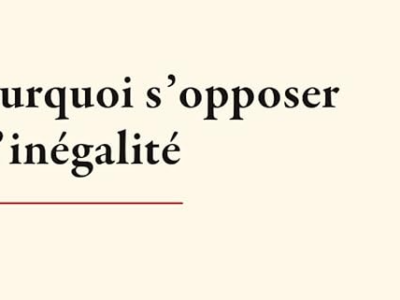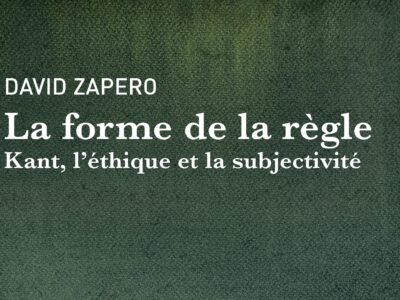The Possibilities of a Failed Promise: Placing Benjamin and Adorno in Dialogue with Rights
Patrick Ahern, Ph.D. is a political and ethical philosopher whose research focuses on themes of Critical Theory, Early Modern Thought, Human Rights Theory, and Critical Social Justice. He received his Ph.D. from Vanderbilt University and is currently serving as a Lecturer in the Department of Philosophy at the University of Dayton in Dayton, Ohio.
Patrick Ahern est un philosophe spécialisé en éthique et en philosophie politique dont les recherches portent principalement sur la théorie critique, la pensée moderne des débuts, la théorie des droits humains et la justice sociale critique. Il est diplômé de la Vanderbilt University (Ph.D) est actuellement maître de conférence au sein du département de philosophie de l’Université de Dayton (Ohio).
Abstract
This essay will explore several points of intervention where the early Frankfurt School writers, notably Theodor Adorno, Max Horkheimer, and Walter Benjamin, critique and inform the residues of possibility left in international (and localized) regimes of human rights. Firstly, their writings offer a challenge to the “liberal lie” in which redemption is promised in formal or strictly ‘political’ terms. In other words, is there a model of rights that would not serve as a kind of “violent” redemption, but rather as concrete emancipation? Secondly, how does the dialectical and historical critiques of Adorno and Benjamin challenge a model of a regime of rights that interrogates the limits and possibilities of the legal formalistic approach in the service of justice for the living? Finally, does dialectical critique allow for a way of theorizing out of the wreckage of a fantastical liberal lie in favor of a praxis of rights that arises out of the experience of the oppressed? In this essay, I will examine the ways the early Frankfurt School writers offer a model of dialectical praxis that exposes the limitations of the human rights tradition that have served to prevent the realization of a heretofore largely unfulfilled promise. Rather than undermining the aspirations of Enlightenment emancipation, these critical reflections provide fertile theoretical resources for what is needed, and what is impeding, the possibility of its realization.
Keywords: Human Rights – Frankfurt School – Theodor Adorno – Walter Benjamin – Leo Lowenthal – Max Horkheimer
Résumé
Cet article explore plusieurs prises de positions par certains des premiers auteurs de l’école de Francfort, notamment Theodor Adorno, Max Horkheimer et Walter Benjamin. Ces derniers ont porté un regard critique sur les possibilités que nous offrent les régimes internationaux (et locaux) des droits humains. En premier lieu, leurs écrits mettent en question le « mensonge libéral » qui promet une rédemption dans des termes purement formels ou strictement « politiques ». Pour le dire autrement, existe-t-il un modèle de droits qui ne seraient pas au service d’une rédemption « violente », mais d’une émancipation concrète ? En second lieu, comment les critiques dialectiques et historiques d’Adorno et Benjamin mettent en cause le modèle d’un régime de droits interrogeant les limites et possibilités d’une approche juridique formelle au service d’une justice pour le vivant ? Enfin, la dialectique critique permet-elle de construire une nouvelle théorie sur les décombres laissés par un fantastique mensonge libéral, en développant une praxis des droits qui part de l’expérience des oppressés ? Dans cet article, j’examinerai les manières dont les premiers auteurs de l’école de Francfort ont forgé un modèle de praxis dialectique permettant d’exposer les limites de la tradition des droits humains, ayant empêché la réalisation d’une promesse qui reste largement non-tenue jusqu’à aujourd’hui. Plutôt que de miner les aspirations d’émancipation venues des Lumières, ces réflexions critiques nous fournissent des ressources théoriques fertiles pour comprendre ce dont nous avons besoin et ce qui empêche sa réalisation.
Mots-clés: Droits humains – Ecole de francfort – Theodor Adorno – Walter Benjamin – Leo Lowenthal – Max Horkheimer
Introduction
While human rights and rights in general have become the predominant mode of discourse when confronting the concerns of global justice, an engagement of the early Frankfurt School theorists within this discourse has, with some notable exceptions, been neglected. For historical reasons, writers such as Walter Benjamin and Theodor Adorno had little to say about human rights, yet their critical engagements with the promise of emancipation can inform and challenge the way in which a demand for human rights can be put in service of an emancipatory praxis. In The Dialectic of Enlightenment, Horkheimer and Adorno associated the talk of rights with the “liberal lie” that promises happiness, but in a world without power. However, their critique of liberal “rights” did not amount to the dismissal of the establishment of rights or the Enlightenment project in toto. Rather than abdicating the possibilities that emerge in the wake of the failed attempts at an undialectical and uncritical human rights regime, the insights and warnings of Benjamin and Adorno serve as a challenge to traditional models of enacting global justice. They provide a dialectical engagement that emerges “out of” the experience of the oppressed and suffering to offer the resources for new models of emancipation that animate the concerns of global justice to act as a brake to incessant catastrophe. It would not be possible in the context of this brief essay to offer an exhaustive account of how the critical theories of Benjamin and Adorno can inform global justice and rights, but I will briefly attempt to delineate to the model of emancipation offered in human rights discourse and to evaluate the extent to which rights can corral a “weak messianic power” in the service of the oppressed. I will also look at the conditions that prevent the realization of the promise of right. Commonly, this would entail an institutional or legal analysis of the machinations needed for a rights regime. And while these questions are of grave importance, I will highlight the way in which Benjamin and Adorno provide the framework for a critical analysis of rights that emerges “out of” the experience of those suffering, rather than restricted to the organization and administration of top-down social and political institutions enacting a “human rights regime.”
I. Rekindling the Revolutionary Spark
The history of the tradition of rights is complex and fractured, splitting into various camps, and quite often undermining the revolutionary idea that animated the emergence of rights discourse in the Enlightenment. The idea of human rights, before splintering under the force of bourgeois power, revealed what Etienne Balibar describes as the “paradoxical thesis” of “egalitarian sovereignty.” The revolutionary insight of the “power of the people” miscarried and “what was true as an idea” to quote Horkheimer and Adorno, devolved into the “liberal lie.” The failure of the promise of democratic power unraveled in the development of the liberal State where even the discourse on human rights reaches an illogical impasse dividing freedom and equality. Human rights, and the promise of democratic emancipation, was transformed from a revolutionary spark to a teleological goal; an endless task that, in its liberal guise, has devolved into a weakened abstraction. The promise of egalitarian sovereignty was undermined with the fracturing of the revolutionary spirit into an ideology preserving bourgeois interest. This idea, of course, is the model of emancipation and the overthrowing of detached and oppressive power, whether it be the monarch or the liberal state.[1] In the “Paralipomena to “On the Concept of History,” Benjamin describes the transformation from profane revolutionary spark to mythical ideology in writing, “The idea of classless society. Marx secularized the idea of messianic time. And that was a good thing. It was only when the Social Democrats elevated this idea to an “ideal” that the trouble began. The ideal was defined in Neo-Kantian doctrine as an “infinite task.”[2] In the draining of the revolutionary element in rights to form a world based upon the values of freedom and equality, rights discourse has often devolved into an apologia for the status quo appealing to an endless and unfulfilled promise of justice. As Benjamin warns in the “Theological-Political Fragment,” “The Kingdom of God is not the telos of the historical dynamic; it cannot be established as a goal. From the standpoint of history, it is not the goal but the terminus [Ende], Therefore, the secular order cannot be built on the idea of the Divine Kingdom, and theocracy has not political but only a religious meaning.”[3] In other words, the transformation of the demands for human rights and democratic power ceased to have revolutionary force once it became no longer a demand for the present, but rather a teleological ideal for which there is only a future that never arrives. Benjamin interrupts the discussion of rights to ask if there is a model of rights that would not serve as a kind of “violent” redemption, but rather as concrete emancipation. The promise of a mythical redemption for human rights is not only a theoretical mode of violence, but is played out in the persistence of atrocities that continue under an uncritical human rights regime. Benjamin challenges this promise of a mythical ideal for a demand for justice in the present.
The strength of the dialectical critiques of Benjamin and Adorno, contra much of the theory that surrounds human rights discourse, emerges from the insistence of understanding the complex historical, political, and psycho-social conditions that make even the most grotesque atrocities possible. If a theorist is to follow Benjamin’s call for “a total absence of illusion about the age and at the same time an unlimited commitment to it,” it is necessary to understand the forces opposing the possibility for global justice.[4] The challenge to the promise of human rights does not only come from so-called ‘liberals,’ but more and more, the populist resentment of human rights as a liberal lie. As Horkheimer and Adorno explain in the Dialectic of Enlightenment,
[The]…liberal thesis is true as an idea. It contains the image of the society in which rage would no longer reproduce itself or seek qualities on which to be discharged. But by assuming the unity of humanity to have already been realized in principle, the liberal thesis serves as an apology for the existing order.[5]
The true idea, having been distorted and detached from the conditions of its fulfilment, generates popular resentment:
Liberalism had granted the Jews property but without the authority to command. The purpose of human rights was to promise happiness, even where power was lacking. Because the cheated masses are dimly aware that this promise, being universal, remains a lie as long as classes exist, it arouses their anger; they feel themselves scorned. They must constantly repress the thought of that happiness, even as a possibility, an idea, and they deny it all the more fiercely the more its time has come.[6]
The popular reaction to the “liberal lie” does not turn against the material relations that expose the promise of liberal human rights as a lie, but rather adapts to those conditions in developing a defensively aggressive attitude against the idea of a world in which freedom and equality could be realized. Adorno detects this resentment with dire consequences for both the promotion of emancipation and the prevention of human atrocities. He writes, “Those whose real powerlessness shows no sign of ceasing cannot tolerate even the semblance of what would be better; they would prefer to get rid of the obligation of autonomy, which they suspect cannot be a model for their lives, and prefer to throw themselves into the melting pot of the collective ego.”[7] Rather than emancipation, the powerless are seduced into the more ‘realistic’ offerings of the self-defeating and paradoxical power of destructive vengeance.
After having been denied in practice the promised world of equality and freedom, a significant element in society experiences resentment and, ultimately, rage. In his analysis of the ‘American agitator’ of the 1930’s, Leo Lowenthal offers an analysis of the frustrated American populace that have given up on the promise of human rights in favor of right-wing populism. In a passage that strikes as more urgent today than even when it was written, Lowenthal reveals that the failed promise of human rights has left a new offering in its wake, when he writes, “a promise of a share in actual social control may serve as a powerful antidote to the pervasive and frustrating sense of exclusion…Not the traditional “gravy” promised by politicians, but power to exercise violence is what the agitator offers his followers.”[8]The reaction against the failed promise of human rights turns into the more tangible possibility of releasing rage against a social order that undermines that promise. But rather than turning this frustration against the social order that denies freedom and equality, those rights become the source of privilege for “real Americans.”
The basic implications of the agitator’s “defense” of American principles is that the human rights he proclaims should be turned into a privilege.” Lowenthal continues, “The privilege here offered to the endogamic elite includes the essential promise to implement their rights as Americans by a vague permission (made more thrilling because it is accompanied by an apparent denial – “No, we do not mean a pogrom”) to participate in the coercive functions of society.[9]
Such populist echoes in resistance to human rights can be heard in the rising nationalist movements in Europe and the United States. Adorno’s diagnosis of the psycho-social conditions of promoting the rise of authoritarian coldness is reflected not only in the immigration and foreign policies of the United States that flaunts international human rights concerns, but in the reception of this rejection of the value of human rights. From the call to arms against protests for equality and the rising atrocity of camps at the border to brazen support for the Saudi and Philippine governments in the face of clear atrocities, the values of national ‘purity’ and avoiding things that would interrupt the order of business become the highest values. Rather than hiding from endorsing the violation of the international standards set, for example in the UDHR, politicians harness a reactionary mood that places a high premium to adapting to the realpolitik of international business, along with nationalist and racial rage. The promise of being on the winning side of “law and order,” including the underlying promise of being able to release violent rage against the very possibility of a just world, replaces the promises of freedom and equality. If one is to live with an “absence of illusion” about our age, we must heed Adorno’s reflections upon the threat of such “overvalued realism” and examine the conditions that promote reactionary responses, i.e. the presumption of a free and equal world under the force of stratified oppression. The amazement expressed in traditional liberal circles is born out of an ignorance of the relation between powerlessness and dangerous affective responses. Adorno and Benjamin are timely in their diagnosis that, if we wish to prevent continuing atrocity, we must recognize the broader psycho-social conditions that allow them to persist and grow. Or, as Benjamin writes, “The current amazement that the things we are experiencing are “still” possible…is not philosophical.”[10]
While the depth and complexity of Adorno and Benjamin’s insights regarding the development of rights extends beyond traditional concerns of legal abstraction or institutional corruption, this is not to suggest that both thinkers do not identify the value and limitations of human rights, especially as it has become manifest in the years since their passing. While a thorough treatment of the Frankfurt School’s critique of legal formalism and institutional violence is beyond the scope of the present essay, I believe it is important to recognize the level of nuance offered, especially by Adorno, regarding the value and limitations of formalistic or legalistic protections widely endorsed in the current literature on human rights. The Marxist critique of rights as formalized in such a way that they have the power to serve as ideological cover to bourgeois interests is a concern shared by both Adorno and Benjamin. The critique of legal abstraction and human rights claims emerges out of a more general engagement with the promise and challenges that arise in Western thought as expressed in Kantian formalism. Clearly, human rights discourse cannot be reduced to a legalistic exercise, but this discourse also provides models for ethical ideals and critical concepts of justice. When providing a critique of formalism, Adorno recognizes that the protections provided by such formalism are not sufficient for fulfilling the promise of human rights, but they are necessary and meaningful. In his “History and Freedom” lectures, Adorno provides a nuanced understanding of the role of such formalism, when reflecting that,
This formalization contains the entire history of the rationalization of Western philosophy and Western society, including its progressive aspects. It is my belief that, when people talk about the problem of so-called formalism in ethics, they are all too easily tempted to ignore this element. If I may formulate this more concretely, I would say that so-called Kantian formalism incorporates the recognition of the bourgeois equality of subjects, not just before the law, the legal system, but also before the moral law. Anyone who like me has had experience of what the world looks like when this element of formal equality is removed – from the legal system, let us say – in favor of specific substantive values that are asserted in an a priori fashion, he will know from his own fear, just how much of humane value resides in this concept of the formal.[11]
Adorno is offering a warning that, while recognizing the dangers that come with theorizing in a manner that moves at the surface of abstraction, the formal protections of the bourgeois principle of equality can thwart the violent injustices of arbitrary fascistic impulses, even if they do not assure the emancipation that they promise. Adorno continues, “Our world, as you know, is organized according to the principle of exchange, the principle of equality; it is a world governed by abstract rules. In an unchanging abstract system, every appeal to concrete distinctions always, necessarily, becomes an injustice to concrete human beings.”[12] In other words, the limitations of Kantian formalism and the bourgeois principle of equality, while providing a model of fractured emancipation, holds within it a theoretical model for providing a world that may be organized in a rational manner. The challenge for human rights theory will be to harness the critical force of this ‘formalism’ while challenging its self-defeating limitations; in other words, they are presenting a critical and dialectical redeployment of Enlightenment reasoning. The enactment of laws that break from the revolutionary promise of freedom and equality run the risk of preserving an unjust status quo. Rather than serving the mythical ideal of justice as a form of what Benjamin would term “lawmaking violence,” human rights in the contemporary world demands rigorous internal and external critique. The examples of human rights discourse being deployed in service of mythical “law-preserving violence” can be found in the so-called “peace-keeping” missions that have worked against the interests of the oppressed. Both Adorno and Benjamin provide the critical lens through which the possibility of justice in the name of human rights could be achieved.
 Perhaps the central insight that Marx provides when considering the dangers of legal formalism is that it is born out of, and thus reproduces, the injustice of social orders based upon hierarchies of class stratification. In the context of human rights law, the danger, according to Horkheimer and Adorno, arises in the fetishization of the ideal of ‘enlightened’ justice. The above passage makes clear that Adorno recognizes the value of the Enlightenment ideals even when expressed formally as ethical principles or as law. However, the promise of these ideals become limited, and perhaps altogether undermined, when the critical concepts that guide the Enlightenment, rather than becoming actualized, become fetishized. In the Dialectic of Enlightenment, Horkheimer and Adorno, draw upon this duplicity in the image of justice as they move from the mythical to the ‘enlightened’ world, when they write: “Earlier, fetishes had been subject to the law of equivalence. Now equivalence itself becomes a fetish. The blindfold over the eyes of Justitia means not only that justice brooks no interference but that it does not originate in freedom.”[13] The image of a just and emancipated humanity that arose in the Enlightenment does offer a unified model of justice that coalesces in the call for liberty, equality, and fraternity. However, this ideal of justice can only be realized by working through the fractured historical and social roots of injustice out of which the modern conceptions of human rights were born. In order for human rights to serve the democratic values that the blindfold covering the eyes of Lady Justice represent, the work of human rights must reckon with social and historical factors that have weighed down the possibility of any such achievement. Otherwise, this blindness will not serve equality and freedom, but rather it will serve to hide a fractured and oppressive social order masquerading as justice in the name of human rights. In Horkheimer and Adorno’s terms, the challenge is to resist the fetishization of these ideals of the Enlightenment, thus creating an opening for the possibility of their realization.
Perhaps the central insight that Marx provides when considering the dangers of legal formalism is that it is born out of, and thus reproduces, the injustice of social orders based upon hierarchies of class stratification. In the context of human rights law, the danger, according to Horkheimer and Adorno, arises in the fetishization of the ideal of ‘enlightened’ justice. The above passage makes clear that Adorno recognizes the value of the Enlightenment ideals even when expressed formally as ethical principles or as law. However, the promise of these ideals become limited, and perhaps altogether undermined, when the critical concepts that guide the Enlightenment, rather than becoming actualized, become fetishized. In the Dialectic of Enlightenment, Horkheimer and Adorno, draw upon this duplicity in the image of justice as they move from the mythical to the ‘enlightened’ world, when they write: “Earlier, fetishes had been subject to the law of equivalence. Now equivalence itself becomes a fetish. The blindfold over the eyes of Justitia means not only that justice brooks no interference but that it does not originate in freedom.”[13] The image of a just and emancipated humanity that arose in the Enlightenment does offer a unified model of justice that coalesces in the call for liberty, equality, and fraternity. However, this ideal of justice can only be realized by working through the fractured historical and social roots of injustice out of which the modern conceptions of human rights were born. In order for human rights to serve the democratic values that the blindfold covering the eyes of Lady Justice represent, the work of human rights must reckon with social and historical factors that have weighed down the possibility of any such achievement. Otherwise, this blindness will not serve equality and freedom, but rather it will serve to hide a fractured and oppressive social order masquerading as justice in the name of human rights. In Horkheimer and Adorno’s terms, the challenge is to resist the fetishization of these ideals of the Enlightenment, thus creating an opening for the possibility of their realization.
The undialectical approaches to human rights often comes in the form of top-down approaches that are not adequately responsive to the suffering of the victims of injustice. In order to ‘bear witness’ to such atrocities, there must be an understanding of the broader social and historical forces that are at work, as well as a receptivity to the suffering of the oppressed out of which a program for human rights must emerge. The incapacity to bear witness to the suffering of the victims of human rights abuses undermines the promise of global justice. As Adorno writes, “The need to lend a voice to suffering is a condition of all truth. For suffering is objectivity that weighs upon the subject; its most subjective experience, its expression, is objectively conveyed.”[14] If human rights are to champion the cause of the oppressed and suffering, there will need to first be a reflection on the capacity to experience and remember this suffering. In remembrance, the historical forces that have prevented the realization of the promise of human rights can be addressed. The most urgent promise of human rights is to respond to and prevent atrocities that violate basic human needs. The work of Benjamin and Adorno prove to be an essential resource in confronting the dangers of cutting off the source of resisting injustice; that is, the experience of suffering. I will focus on two aspects of responsiveness and remembrance as the necessary foundation of any conception of human rights that could work in the service of the oppressed.
II. Responsiveness and Remembrance
The connection between the lack of responsiveness to suffering and large-scale atrocities is well defined in the writings of Adorno, Horkheimer, and Benjamin. The causes of such unresponsiveness are multi-faceted, however both writers view this issue in social and historical terms. In other words, what in one light may appear to be a matter of simple epistemological concern regarding human knowledge is shown to have grave ethical consequences and should be understood not in terms of simple falsity, but barbarism.
Indeed (let’s admit it), writes Benjamin, our poverty of experience is not merely a poverty on the personal level, but poverty of human experience in general. Hence, a new kind of barbarism.
Barbarism? Yes, indeed. We say this in order to introduce a new, positive concept of barbarism. For what does poverty of experience do for the barbarian? It forces him to start from scratch; to make a new start; to make a little go a long way; to begin with a little and build up further, looking neither left nor right. Among the great creative spirits who begin by clearing a tabula rasa. They need a drawing table, they were constructors.[15]
The isolated subject, in harnessing the a-historical and a-social perspective as found in the cogito, wins a tremendous capacity to build an ideological and material world. However, this achievement comes at the cost of building a world that is indifferent to human suffering. To be sure, the history of human rights is rife with examples that undermine the revolutionary spark of demanding freedom and equality for living human beings. The rise of individualism is one significant factor preventing the capacity for the experience of suffering. Horkheimer identifies the “atomization of man” as a considerable force working against the possibility of emancipation. “The emancipation of the individual is not an emancipation from society, but the deliverance of society from atomization.”[16] Human rights, as a product of the liberal tradition, has been burdened by that traditions’ reverence for and exaltation of the isolated individual.
Liberalism may be said to have considered itself the sponsor of a utopia that had come true, needing little more than the smoothing out of a few troublesome wrinkles. These wrinkles were not to be blamed on the liberalistic principle, but on the regrettable nonliberalistic obstacles that impeded its complete fruition. The principle of liberalism has led to conformity through the leveling principle of commerce and exchange which held liberalistic society together. The monad, a seventeenth-century symbol of the atomistic economic individual of bourgeois society, became a social type. All the monads, isolated though they were by moats of self-interest, nevertheless tended to become more and more alike through the pursuit of this very self-interest.[17]
A central self-defeating aspect of the human rights tradition has come through linking its model of emancipation in the isolation and economic exchange of the individual-as-monad. The consequences of this shared history are at least two-fold, the first is that the model of emancipation has become distorted, and the second is that the isolation of perceived interests has blocked the capacity for experience the suffering of the oppressed. The flight toward detached abstraction or un-reflective and un-responsive activity has had consequences in which the promise of human rights have turned against those that they are ostensibly created to protect.
In order for the promise of human rights to be fulfilled, there must be an understanding of both the theoretical and socio-psychological factors that prevent its realization in affective coldness. Adorno places this lack of responsiveness in more explicitly political and psychological terms. In “Education After Auschwitz,” Adorno draws the direct line from this unresponsiveness to human suffering and the horrors of the concentration camps. “One speaks of a relapse into barbarism.” He warns, “But it is not a threat – Auschwitz was this relapse, and barbarism continues as long as the fundamental conditions that favored that relapse continue largely unchanged.”[18] The language of relapse is appropriate for Adorno’s analysis because he is deploying a critique of both the objective conditions that foster such unresponsive affect as well as the subjective pathologies that promote coldness. Adorno writes,
Dominant ideology today dictates that the more individuals are delivered over to objective constellations, over which they have, or believe they have, no power, the more they subjectivize this powerlessness. Starting with the phrase that everything depends on the person, they attribute to people everything that in fact is due to the external conditions so that in turn the conditions remain undisturbed. Using the language of philosophy, one indeed could say that the people’s alienation from democracy reflects the self-alienation of society.[19]
One’s submission to the objective conditions operates to the same extent as one is isolated from experiencing other people. The extensive reasons for such a cold, reified consciousness are many, but the primary cause is experience of objective conditions as an alien force that calls for adaptation and conformity. Detachment and authoritarian prejudice come together for Adorno in his account of “reified consciousness” when he writes, “people of such a nature have assimilated themselves to things. And then, when possible, they assimilate others to things.”[20] Adorno calls for a more thoroughgoing psychoanalysis of anti-Semites and authoritarians to understand how this lack of responsiveness develops within a society. In passages that are prescient to the challenges of world today, Adorno highlights the paradox of contemporary fetishized relations to technology in which one’s absorption into the flow of technological advancement leads to a regression of one’s capacity for the libidinal ties that could be a source of resistance to the objective conditions that ensure to powerlessness. The self-defeating power of the ideology of progress as well as the overwhelming of affective experience with the need to adapt to technological advancement is cautioned by Horkheimer when he writes, “The circumstance that the blind development of technology strengthens social oppression and exploitation threatens at every stage to transform progress into its opposite, complete barbarism. Both static ontology and the doctrine of progress- both objectivistic and subjectivistic forms of philosophy – forget man.”[21] A critical approach to human rights will have to account for the ways in which a capacity for developing loving social ties could be fostered, not out of moralistic pleas, but rather beginning with an understanding of the objective and subjective conditions that preserve the status quo.
Horkheimer identifies these challenges to confronting human rights atrocities by developing an ethics and critical theory that is based in compassion and solidarity. The responsiveness of his ethics is described by Jose Manuel-Barreto as manifesting in the primacy of “sympathy” that ultimately grounds an ethics that is not founded upon isolated interests or apolitical decision-making, but rather upon the experience of, and solidarity with, those suffering under a specific historico-political context. He writes, “For Horkheimer, a materialist perspective requires the adoption of, as a point of departure for ethics, a consideration of the historical circumstances in which human beings live and, therefore, the assumption of fragility, finitude, contingency and suffering as basic characteristics of the human condition.”[22]The capacity for critical reflection to be responsive to the ‘imperative’ of “never again Auschwitz” requires a rationality that is not beholden to the coldness of “protestant stoicism.”[23] “The examination of modern reason in the field of morality has its own specificity,” Barreto writes, “pointing not only to the problem of instrumentality but also to the specific impasse of reason.”[24] Horkheimer’s famous critique of instrumental reason provides a challenge not only to the submissiveness entailed in only concerning our rational reflections upon means and not ends, but also upon understanding critical rational reflection as a mode of resistance to the coldness that Benjamin and Adorno also identify as a source of the barbarism at the center of human rights atrocities. Horkheimer’s reflection on rationality resists the expulsion of passions from reason, but rather attends to the happiness and suffering of the other in the form of and ethos of compassion and solidarity. Herbert Schnadelbach identifies this connection of passion and reason in Horkheimer’s writings, ultimately manifesting in a call for solidarity when he writes,
According to Horkheimer, it is the universalistic perspective of a claim of all to happiness – itself neither further justifiable nor in need of justification – the first makes love morally relevant as inclination, emotion, and passion. Love in this sense is that aspect of a moral feeling that makes the Other – as Kant formulated it – not a mere means but recognizes here or him as an end; she or he is an end in light of the anticipation of liberated and happy humanity. The psychic reality of this anticipation, however, is compassion, which recognizes itself in the Other; therefore, the active form of such anticipation is solidarity.[25]
A central issue for human rights has not only been receptiveness to suffering but also capacity for remembrance in order to, as Adorno puts it, “work through” the past. Since a-historical construction has been shown to lead to the relapse into barbarism, the concern of global justice and human rights must first emerge out of a reckoning with the past. In Benjamin’s view, the power of working through the conditions that silence the suffering of those that could expose lost possibilities and failures, illuminates their capacity for harnessing a “weak messianic power” that could pull the brakes on the road to relapse.[26] The desire to flee from a past that piles the wreckage of human suffering at our feet is understandable. However, this flight from remembrance ensures the persistence of wounds that are never given the opportunity to heal. Adorno points out, “One wants to break free of the past: Rightly, because nothing at all can live in its shadow, and because guilt and violence are repaid with guilt and violence; wrongly, because the past that one would like to evade is still very much alive.”[27] The “truth” of the liberal thesis, according to Horkheimer and Adorno, “contains an image of the society in which rage would no longer reproduce itself or seek qualities on which to be discharged.”[28] However, if the truth of this thesis is not to devolve into the relapse of a lie, then any conception of human rights must focus upon remembrance of the suffering that exerts present-day force. The liberal impulse to “move on” to the “order of the day” must be checked by the truism that one “must do without the consolation that the truth cannot be lost.”[29] The only possibility that contemporary humanity has to claim the revolutionary insights of a free and empowered present is to break the spell of the past. In the sixth thesis of “On the Concept of History,” Benjamin highlights the danger that a world without remembrance exerts upon the present:
The danger threatens both the content of the tradition and those who inherit it. For both, it is one and the same thing: the danger of becoming a tool of the ruling classes. Every age must wrest away from the conformism that is working to overpower it. The Messiah comes not only as the redeemer; he comes as the victor over the Antichrist. The only historian capable of fanning the spark of hope is the one who is firmly convinced that even the dead will not be safe from the enemy if he is victorious.[30]
Adorno provides a concrete analysis of the methods of remembrance and forgiveness that must be central to any possibility of living up to the promise of global justice. This forgiveness cannot be given as a theological imperative or as an exercise in forgetting, as some attempts at “truth and reconciliation” have been accused of engineering. “The attitude that everything should be forgotten and forgiven,” writes Adorno, “which would be proper for those who suffered injustice, is practiced by those party supporters who committed the injustice.”[31] The insights of Adorno and Benjamin provide the critical challenge to the model of human rights that fails to ‘work through’ the past, abdicating the power to realize the possibilities of a failed promise.
Conclusion: Weak Messianic Possibility
In this essay, I have begun to scratch the surface of the invaluable and largely untapped potential of bringing Benjamin, Adorno, and Horkheimer’s critical insights to bear upon a human rights praxis. If human rights, as the preeminent discourse on global justice, is going to draw from its ‘truth,’ then there must be a critical engagement that looks critically at not only the social, legal, and political institutions that will do the work of human rights, but there must also be a persistent analysis of both the objective and subjective conditions that prevent the realization of a world in which the threat of a relapse into barbarism is stifled. The very foundation of any Messianic possibility must emerge out of the experience of the oppressed and the working through of the past. Placing the insights of Benjamin, Horkheimer and Adorno as interventions into the discourse on human rights provides the possible conditions of realizing what has proven illusory in a heretofore failed promise.
[1]One could very well provide a critique of predominant “communist” states along the similar lines. That is, the ways in which the Soviet and Chinese state, rather than embodying the “power of the people,” have serve as an overarching power at the expense of those living under these regimes.
[2]Walter Benjamin, “Paralipomena to ‘On the Concept of History,’” Selected Writings: Volume 4, 1938-1940 (Cambridge, MA: Harvard University Press, 2003) 401.
[3]Walter Benjamin, “Theological Political Fragment,” Selected Writings: Volume 3, 1935-1938 (Cambridge, MA: Harvard University Press, 2002) 305.
[4]Walter Benjamin, “Experience and Poverty,” Selected Writings: Volume 2, Part 2, 1931-1934 (Cambridge, MA: The Belknap Press of the Harvard University Press, 1999) 733.
[5]Max Horkheimer and Theodor Adorno, Dialectic of Enlightenment, Translated by Edmund Jephcott (Stanford, CA: Stanford University Press, 2002) 138.
[6]Max Horkheimer and Theodor Adorno, Dialectic of Enlightenment 141.
[7]Theodor Adorno, “The Meaning of Working Through the Past,” Critical Models: Interventions and Catchwords, trans. by Henry W. Pickford (New York: Columbia University Press, 1998) 99.
[8]Leo Lowenthal, False Prophets (New Brunswick, NJ: Transaction Publishers, 1987) 129
[9]Leo Lowenthal, False Prophets 112.
[10]Walter Benjamin, “On the Concept of History,” Selected Writings: Volume 4, 1938-1940 392.
[11]Theodor Adorno, History and Freedom: Lectures 1964-1965 (Malden, MA: Polity Press, 2006) 253.
[12]Ibid.
[13]Theodor Adorno and Max Horkheimer, Dialectic of Enlightenment 12.
[14]Theodor Adorno, Negative Dialectics, trans. E.B. Ashton (New York, NY: Continuum Publishing, 1973) 17-18.
[15]Walter Benjamin, “Experience and Poverty,” Selected Writings: Volume 2, Part 2 (1931-1934) 732.
[16]Max Horkheimer, Eclipse of Reason (New York, NY: Oxford University Press, 1947) 135
[17]Max Horkheimer, Eclipse of Reason 139.
[18]Theodor Adorno, “Education After Auschwitz,” Critical Models: Interventions and Catchwords 190.
[19]Theodor Adorno, “The Meaning of Working Through the Past,” Critical Models: Interventions and Catchwords 93.
[20]Theodor Adorno, “Education After Auschwitz,” Critical Models: Interventions and Catchwords 199.
[21]Max Horkheimer, Eclipse of Reason 134.
[22]Jose-Manuel Barreto, “Ethics of Emotions as Ethics of Human Rights: A Jurisprudence of Sympathy in Adorno, Horkheimer and Rorty,” Law and Critique 17 (2006) 95.
[23]Jose-Manuel Barreto writes, “The ostracism of emotions from the Kantian moral landscape leads to the conclusion according to which Stoicism is the bourgeois philosophy.” 80
[24]Jose-Manuel Barreto 79.
[25]Herbert Schnadelbach, “Max Horkheimer and the Morality of German Idealism,” in On Max Horkheimer:New Perspectives, ed. By Seyla Benhabib, Wofgang Bonb, and John McCole (MIT Press: 1993) 294.
[26]Walter Benjamin, “On the Concept of History,” Selected Writings: Volume 4, 1938-40. 390.
[27]Theodor Adorno, “Meaning of Working Through the Past” 89.
[28]Max Horkheimer and Theodor Adorno, The Dialectic of Enlightenment 138.
[29]Theodor Adorno, Negative Dialectics 34.
[30]Walter Benjamin, “On the Concept of History,” Selected Writings: Volume 4, 1938-40 391.
[31]Theodor Adorno, “The Meaning of Working Through the Past” Critical Models: Interventions and Catchwords 89.














